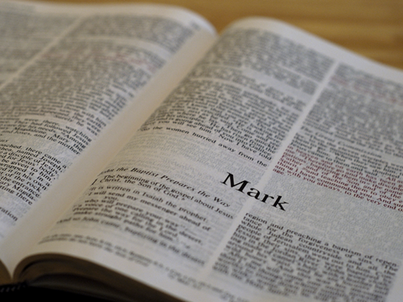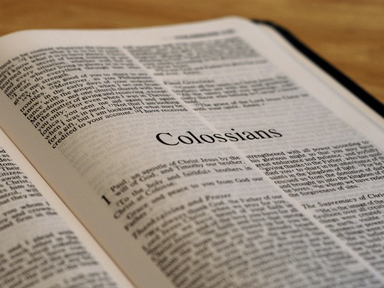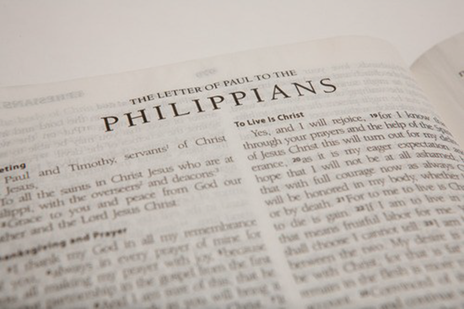
"For even the Son of Man did not come to be served, but to serve, and to give His life a ransom for many." Mark 10:45
Who was Mark? John Mark was born in Cyrene in Africa, of the tribe of Levi. While John (Johanna) is a Hebrew name meaning The Lord has shown grace, Mark comes from the Latin Marcus. John Mark was a cousin of Barnabas (Colossians 4:10) and of the apostle Peter. His mother, Mary, played an active role in the early days of the Church in Jerusalem. John Mark received an excellent education and was fluent in Hebrew, Greek and Latin. He had the privilege of growing up in a God-fearing home and surrounded by the leaders of the early Church. The Upper Room His mother, Mary's, upper room was the venue for the Passover supper, used by the Lord Jesus for His Last Supper with His disciples. It was in the same upper room that the Lord appeared to the disciples after the Resurrection. It was to John Mark's mother's home that Peter went, when freed from prison (Acts 12:12). The Evangelist John Mark was present at the Wedding at Cana in Galilee (John 2:1-11). He was one of the 70 disciples sent out to proclaim the Gospel (Luke 10:1-17). Mark was the young man, who, on the night that the Lord was betrayed, was following the Lord wearing a linen garment (Mark 14:51-52). The Missionary John Mark accompanied the Apostle Peter on his Missionary journeys in Jerusalem and Judea. He was also privileged to be part of the Apostle Paul's first Missionary journey (Acts 13). Although he failed to complete his mission, he later repented, restored and made restitution to rebuild Paul's trust in him. So much so, that Paul, in his pastoral letter to Timothy, describes Mark as "helpful to me in my ministry" (2 Timothy 4:11). Mark became a co-worker with the Apostle Peter (1 Peter 5:13). Mark established churches in Pentapolis and in Alexandria, Egypt.
0 Comments

To listen to the audio of this sermon, click here for Part 1 and here for Part 2.
“All who dwelt in Asia heard the Word of the Lord Jesus…” Acts 19:10 Colosse in the Province of Asia Colossians is a prison Epistle written in Rome while Paul was in prison there. The Church at Colosse was founded at the same time as the Church in Ephesus. The Epistle to the Colossians was written at the same time as the Epistles to the Ephesians. Epaphras carried the three letters to each destination. Colosse was a cultural and religious melting pot. There were Greek, Jewish and Oriental religious ideas merging together. Colosse was once an important town, but by the time this letter was written, Colosse had been side-lined and overshadowed by nearby Laodicea, which was receiving far more traffic. Colosse became more of a market place and today is completely uninhabited and does not exist. Colossians and Ephesians Both Colossians and Ephesians contain great doctrines of the Gospel which was read aloud to the churches, but each was written for very different sets of circumstances. Ephesians is calling believers the Body of Christ. Colossians talks about the Head of the Body, Jesus Christ. In Ephesians, the Church of Christ is the important emphasis, but in Colossians, it is the Christ of the Church that is emphasised. Both are needed. You cannot have a body without a head. False Christology is at the Root of all Heresy Heresy has broken out in the church of Colosse, misleading the young believers and calling for strict observance of Jewish ceremonies and rituals. The message of Colossians was written to counter these false teachers that is leading them away from the pre-eminence of Christ. The place that Christ holds in any religion determines how true or how false it is. Every cult has a false idea of Christ. They either deny His finality, or His divinity. Misrepresenting the truth of who Christ is and what He has accomplished and His person in His work is the root of all heresy. 
To listen to the audio of this sermon, click here for Part 1 and here for Part 2.
“Paul and Timothy, bondservants of Jesus Christ, to all the saints in Christ Jesus who are in Philippi, with the bishops and deacons: Grace to you and peace from God our Father and the Lord Jesus Christ.” Philippians 1:1-2 The Macedonian Call Led to Imprisonment in Philippi Paul is on his second Missionary journey in Europe, he is writing this letter from Rome where he is literally in chains in prison. He is writing to a church that was born from his earlier prison experience. On his Mission to Europe the first church to be planted was in response to the Macedonian call which he received in Acts 16. Paul’s divine deliverance from prison led to the conversion of the Philippian jailer and the beginning of the congregation in Philippi with Lydia and other converts. A Strategic Roman Colony Philippi was historically, militarily, economically and spiritually strategic. Philippi was a Roman colony in Northern Greece, linking Italy with Asia Minor (today, Turkey) on a very strategic road between East and West. Philippi is located on the same plain where Mark Anthony defeated the forces of Brutus and Cassius (who had murdered Julius Caesar). Philippi was the church that Paul, Silas, Luke and Timothy had planted. The jailer who had been led to the Lord by Paul is one of the pillars of the church. Positive Prison Epistle Written in AD62 during Paul’s first imprisonment in Rome, this letter is a thank you for sending Epaphroditus: Thank you for your encouragement and thank you for your support. It is one of the most positive books in the Bible. Paul is overflowing with joy and gratitude and is rejoicing in how strong they are in the Faith, how steadfast and effective they are! |


 RSS Feed
RSS Feed